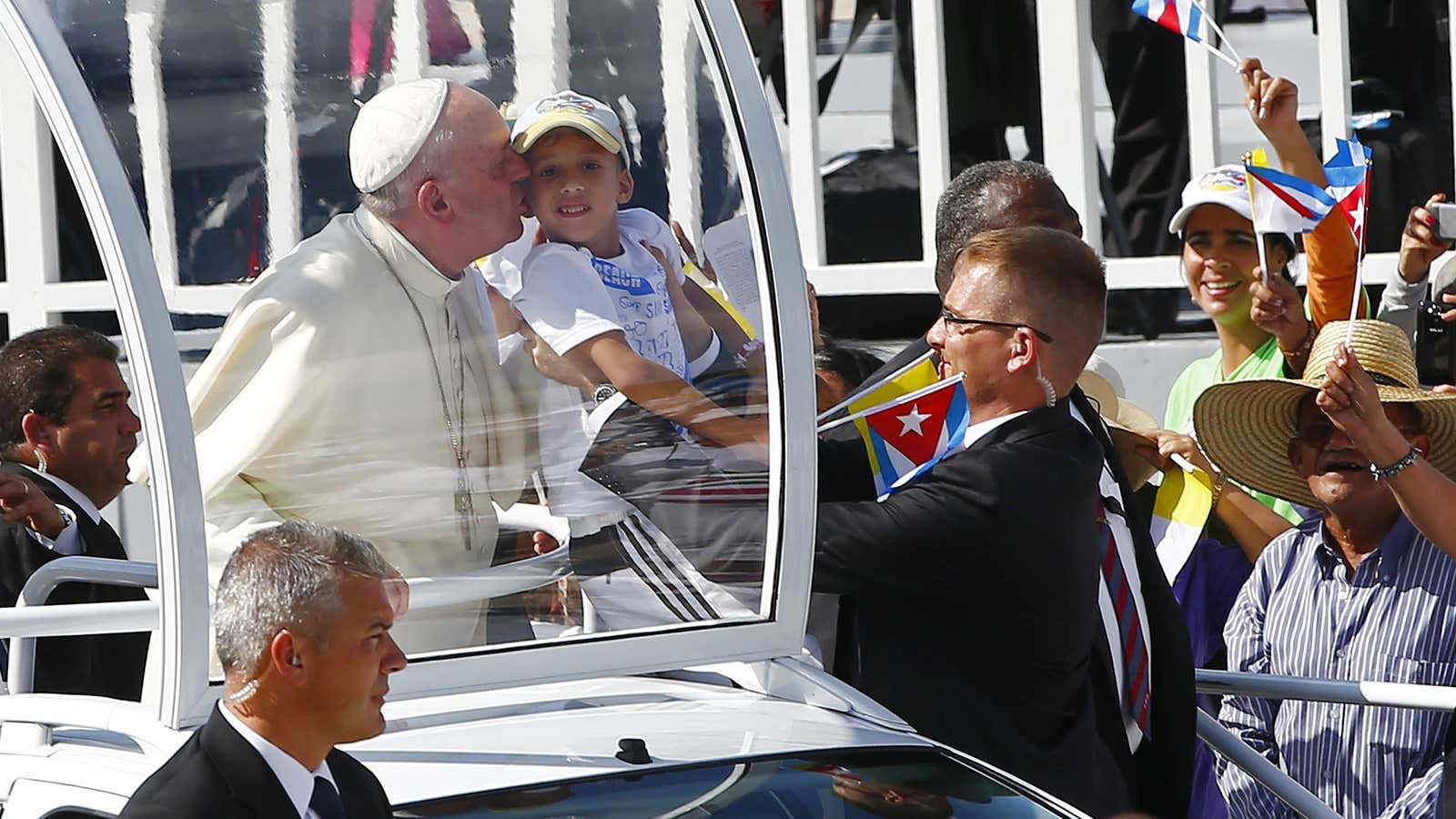For the next few days, Americans will be focused on a Christian who is using an official position to speak out on social issues—drawing throngs of supporters as much as critics. No, I don’t mean Kentucky court clerk Kim Davis, who recently chose jail over issuing same-sex marriage licenses. I’m talking about Pope Francis.
Arguably, in their core convictions, Kim Davis and Pope Francis may be quite similar. By all accounts, Pope Francis is a traditional conservative who opposes both gay marriage and abortion. In practical terms, the pope and Davis likely agree on more than they disagree.
And yet style is everything.
Here’s Kim Davis: “To issue a marriage license which conflicts with God’s definition of marriage, with my name affixed to the certificate, would violate my conscience…. It is about marriage and God’s Word.”
And here’s Pope Francis: “If someone is gay and searches for the Lord and has good will, who am I to judge?”
Kim Davis: “It is not a light issue for me. It is a Heaven or Hell decision.”
Pope Francis: “A person once asked me, in a provocative manner, if I approved of homosexuality. I replied with another question: ‘Tell me: when God looks at a gay person, does he endorse the existence of this person with love, or reject and condemn this person?’ We must always consider the person. Here we enter into the mystery of the human being.”
In reading these quotes, it would not be a mistake to conclude that the pope doesn’t want to judge anyone nor assume whom God judges—but Kim Davis does.
And in general, Pope Francis has made a number of moves to make the Catholic Church more open and welcoming toward lesbian, gay, bisexual and transgender people. Kim Davis, on the other hand, has clearly made her clerk’s office less welcoming for the LGBT community—with her own words and, now, the virulently anti-gay protesters she’s helped marshal.
In fact, while still hewing to the boundaries of his strict beliefs, Pope Francis has been working to make the church more inclusive as a whole. For instance, earlier in September, the pope announced a new policy for the Jubilee Year that would allow priests to forgive women and doctors for abortion. Just as important was the compassionate language with which he announced the change. The pope spoke of women who have abortions because they “believe that they have no other options,” the many he’s met “who bear in their heart the scar of this agonizing and painful decision.” His kind tone would find little echo in the protesters stationed outside abortion clinics, who similarly point to religion as their rationale.
Pope Francis appears to be keenly aware he exists within a changing world, in which his own church as well as the thrust of his beliefs are increasingly in the minority. This has created a practical need, as well as apparently a spiritual desire, to balance his own views and those of the Catholic Church with the rest of the world.
This papal pragmatism is illustrated by yet another example—divorce. Speaking in August of this year, Pope Francis said, “The baptized who have established a new union after the failure of sacramental marriage are not at all excommunicated: they are not excommunicated. And they absolutely should not be treated as such.” Signaling a shift toward a continually more open church, the pope urged, “No closed doors!”
Mind you, on this one the pope and Kim Davis might agree—Kentucky’s self-proclaimed champion of “traditional marriage” has been divorced three times.
In addition to right-wing activists and bloggers, Republican presidential candidates like Mike Huckabee and Ted Cruz have rallied around Davis. For these likeminded candidates, and partisans in general, supporting Kim Davis is about championing faith and religious liberty. Meanwhile many of those same conservatives have been far cooler toward the Holy See. Jeb Bush, for one, has chastised Pope Francis for “getting into politics.”
In the Los Angeles Times, David Horsey wrote: “It would be a great blessing for our republic if the concerns of Pope Francis could find as many champions on the campaign trail as Kim Davis has found for her dubious cause.” What a lovely idea. But so far, it appears Kim Davis is far more popular with today’s Republicans than Pope Francis is.
In his dramatic encyclical on climate change, Pope Francis wrote, “Human beings, while capable of the worst, are also capable of rising above themselves, choosing again what is good, and making a new start.” There’s a spiritual assertion we would be wise to heed—Kim Davis and her ilk included.
